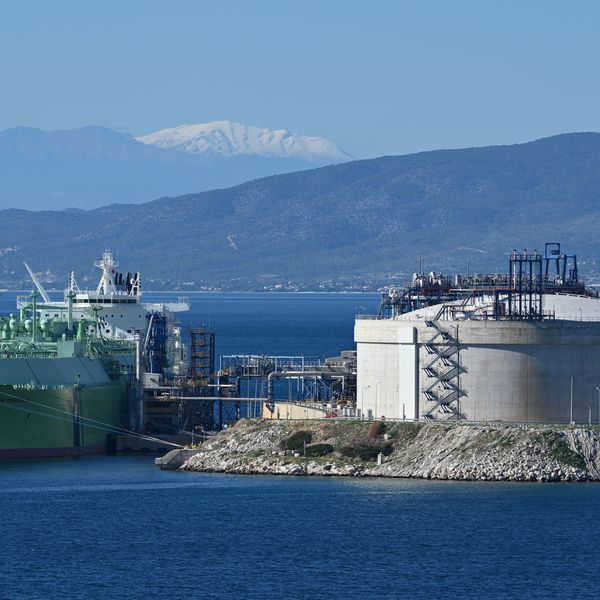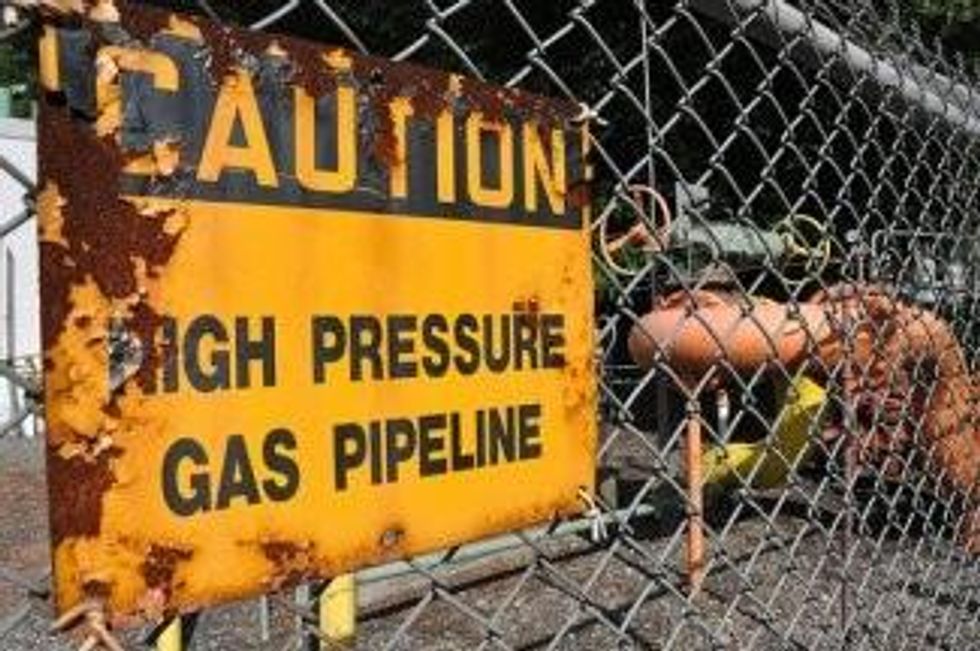Report: Natural Gas Industry Spent Millions to Avoid Fracking Regulations
According to a new report by the nonpartisan group Common Cause, the natural gas industry has pumped millions into Congress to avoid regulation of hydraulic fracturing, also known as "fracking."
Fracking is a controversial method of obtaining natural gas involving injecting a mix of sand, chemicals, and water into a well at high pressure. Questions have been raised about the possibility of polluting groundwater near fracking sites, and was documented in a 1987 EPA study.
The new report details that $747 million has been spent during a successful 10-year campaign. "Players in this industry have pumped cash into Congress in the same way they pump toxic chemicals into underground rock formations to free trapped gas," said Common Cause President Bob Edgar.
Among the report's key findings:
- From 2001 through June 2011, companies now engaged in fracking contributed $20.5 million to current members of Congress. Industry giving more than tripled from the 2001-02 election cycle, when $2 million was contributed, to the 2009-10 election cycle, when $6.8 million was contributed. These same companies spent $726 million on lobbying at the federal level from 2001 through September, 2011.
- Contributions heavily favored current members of Congress who voted for the 2005 Energy Policy Act, which exempted fracking from regulation under the Safe Drinking Water Act. Current members who voted for the bill received an average of $73,433, while those who voted against the bill received an average of $10,894.
- The natural gas industry's fight against regulation has gotten important help at the state level from the American Legislative Exchange Council (ALEC). As documented in an August 2011 Common Cause report, ALEC generates and lobbies for hundreds of model bills every year despite its status as a tax-exempt 501 (c)(3) organization. Prominent financial backers of ALEC's activities include the American Petroleum Institute, ExxonMobil, and Koch Industries, owner of the largest network of natural gas- transmitting pipelines in the country.
"Thanks to the Supreme Court and its Citizens United decision, the natural gas industry will be free to spend whatever it likes next year to elect a Congress that will do its bidding," Edgar said. "The industry's political investments already have largely freed it from government oversight. Controlling the flow of that money and other corporate spending on our elections is critical to protecting our environment for this and future generations."
An Urgent Message From Our Co-Founder
Dear Common Dreams reader, The U.S. is on a fast track to authoritarianism like nothing I've ever seen. Meanwhile, corporate news outlets are utterly capitulating to Trump, twisting their coverage to avoid drawing his ire while lining up to stuff cash in his pockets. That's why I believe that Common Dreams is doing the best and most consequential reporting that we've ever done. Our small but mighty team is a progressive reporting powerhouse, covering the news every day that the corporate media never will. Our mission has always been simple: To inform. To inspire. And to ignite change for the common good. Now here's the key piece that I want all our readers to understand: None of this would be possible without your financial support. That's not just some fundraising cliche. It's the absolute and literal truth. We don't accept corporate advertising and never will. We don't have a paywall because we don't think people should be blocked from critical news based on their ability to pay. Everything we do is funded by the donations of readers like you. Will you donate now to help power the nonprofit, independent reporting of Common Dreams? Thank you for being a vital member of our community. Together, we can keep independent journalism alive when it’s needed most. - Craig Brown, Co-founder |
According to a new report by the nonpartisan group Common Cause, the natural gas industry has pumped millions into Congress to avoid regulation of hydraulic fracturing, also known as "fracking."
Fracking is a controversial method of obtaining natural gas involving injecting a mix of sand, chemicals, and water into a well at high pressure. Questions have been raised about the possibility of polluting groundwater near fracking sites, and was documented in a 1987 EPA study.
The new report details that $747 million has been spent during a successful 10-year campaign. "Players in this industry have pumped cash into Congress in the same way they pump toxic chemicals into underground rock formations to free trapped gas," said Common Cause President Bob Edgar.
Among the report's key findings:
- From 2001 through June 2011, companies now engaged in fracking contributed $20.5 million to current members of Congress. Industry giving more than tripled from the 2001-02 election cycle, when $2 million was contributed, to the 2009-10 election cycle, when $6.8 million was contributed. These same companies spent $726 million on lobbying at the federal level from 2001 through September, 2011.
- Contributions heavily favored current members of Congress who voted for the 2005 Energy Policy Act, which exempted fracking from regulation under the Safe Drinking Water Act. Current members who voted for the bill received an average of $73,433, while those who voted against the bill received an average of $10,894.
- The natural gas industry's fight against regulation has gotten important help at the state level from the American Legislative Exchange Council (ALEC). As documented in an August 2011 Common Cause report, ALEC generates and lobbies for hundreds of model bills every year despite its status as a tax-exempt 501 (c)(3) organization. Prominent financial backers of ALEC's activities include the American Petroleum Institute, ExxonMobil, and Koch Industries, owner of the largest network of natural gas- transmitting pipelines in the country.
"Thanks to the Supreme Court and its Citizens United decision, the natural gas industry will be free to spend whatever it likes next year to elect a Congress that will do its bidding," Edgar said. "The industry's political investments already have largely freed it from government oversight. Controlling the flow of that money and other corporate spending on our elections is critical to protecting our environment for this and future generations."
According to a new report by the nonpartisan group Common Cause, the natural gas industry has pumped millions into Congress to avoid regulation of hydraulic fracturing, also known as "fracking."
Fracking is a controversial method of obtaining natural gas involving injecting a mix of sand, chemicals, and water into a well at high pressure. Questions have been raised about the possibility of polluting groundwater near fracking sites, and was documented in a 1987 EPA study.
The new report details that $747 million has been spent during a successful 10-year campaign. "Players in this industry have pumped cash into Congress in the same way they pump toxic chemicals into underground rock formations to free trapped gas," said Common Cause President Bob Edgar.
Among the report's key findings:
- From 2001 through June 2011, companies now engaged in fracking contributed $20.5 million to current members of Congress. Industry giving more than tripled from the 2001-02 election cycle, when $2 million was contributed, to the 2009-10 election cycle, when $6.8 million was contributed. These same companies spent $726 million on lobbying at the federal level from 2001 through September, 2011.
- Contributions heavily favored current members of Congress who voted for the 2005 Energy Policy Act, which exempted fracking from regulation under the Safe Drinking Water Act. Current members who voted for the bill received an average of $73,433, while those who voted against the bill received an average of $10,894.
- The natural gas industry's fight against regulation has gotten important help at the state level from the American Legislative Exchange Council (ALEC). As documented in an August 2011 Common Cause report, ALEC generates and lobbies for hundreds of model bills every year despite its status as a tax-exempt 501 (c)(3) organization. Prominent financial backers of ALEC's activities include the American Petroleum Institute, ExxonMobil, and Koch Industries, owner of the largest network of natural gas- transmitting pipelines in the country.
"Thanks to the Supreme Court and its Citizens United decision, the natural gas industry will be free to spend whatever it likes next year to elect a Congress that will do its bidding," Edgar said. "The industry's political investments already have largely freed it from government oversight. Controlling the flow of that money and other corporate spending on our elections is critical to protecting our environment for this and future generations."


